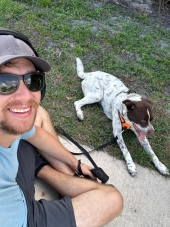
 5
5




 ) and new to permaculture. I mean, I've watched various videos, etc., but I'm pretty much a green newbie.
) and new to permaculture. I mean, I've watched various videos, etc., but I'm pretty much a green newbie.
 I'm eager to learn (and to learn quickly).
I'm eager to learn (and to learn quickly).



 2
2




 8
8




 5
5




Invasive plants are Earth's way of insisting we notice her medicines. Stephen Herrod Buhner
Everyone learns what works by learning what doesn't work. Stephen Herrod Buhner
 5
5




Thanks, Y'all!
 3
3




Tom Grow wrote:
4. Is there a way to buy land on the "down low"? I'd like to keep a low profile, be hard to find, and rather anonymous. This world is crazy and I'd like to kinda disappear. LOL! Maybe this is a question for a different forum. haha!
 6
6




My journal documenting my time living on the Stone Baerm Homestead in summer 2021: https://permies.com/t/160807/Stone-Baerm-Adventures
 1
1




Iterations are fine, we don't have to be perfect
My 2nd Location:Florida HardinessZone:10 AHS:10 GDD:8500 Rainfall:2in/mth winter, 8in/mth summer, Soil:Sand pH8 Flat
 1
1




Tom said, "Is there a way to buy land on the "down low"? I'd like to keep a low profile, be hard to find, and rather anonymous. This world is crazy and I'd like to kinda disappear.
Invasive plants are Earth's way of insisting we notice her medicines. Stephen Herrod Buhner
Everyone learns what works by learning what doesn't work. Stephen Herrod Buhner
 2
2




 5
5




 4
4




Lorinne Anderson: Specializing in sick, injured, orphaned and problem wildlife for over 20 years.

 6
6




Some places need to be wild
 2
2




Hope and dreams...
 3
3




 1
1




 2
2




 1
1








 1
1




Brian Klotsch wrote:"Being self sufficient is not about being able to produce everything you need for yourself. That's delusional."
Wow...a bit harsh and not true...there's a difference between NEED and WANT.
 2
2




"If you always do, what you always did, you'll always get, what you always got!" Mike S.
"It's easy to chop out excess trees. It's really hard to get a mature tree today." Joseph Lofthouse




Come join me at www.peacockorchard.com

|
PI day is 3.14 (march 14th) and is also einstein's birthday. And this is merely a tiny ad:
Looking for cold-climate growers to join a GOOF livestream panel (Missoula)
https://permies.com/t/369111/cold-climate-growers-join-GOOF
|



